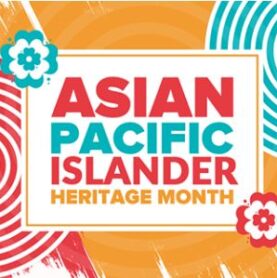The month of May is recognized as Asian American Pacific Islander (AAPI) Heritage Month, a time to recognize the contributions and achievements of the AAPI community, as well as a period of reflection for the historic and ongoing discrimination they face.
May was chosen for AAPI Heritage Month because it commemorates the immigration of the first Japanese people to the United States on May 7, 1843. This month is also the anniversary of Golden Spike Day in 1869, when the transcontinental railroad was completed thanks to significant contributions from Chinese workers.
The U.S. Census Bureau classifies Asians as “having origins in any of the original peoples of the Far East, Southeast Asia, or the Indian subcontinent,” including (but not limited to) China, Japan, Thailand, Malaysia, Korea, India, Cambodia, Vietnam or the Philippines. However, there are many Asian diasporas across the world representing many different languages, religions, cultures and faiths, so people from Central or West Asia may identify as Asian. National data from 2019 shows at least 22.9 million people of Asian or Pacific Islander descent are living in the United States. According to the Pew Research Center, the AAPI population accounts for about 7 percent of the total U.S. population.
What is now a designated month of recognition for the AAPI community started in 1978 as a weeklong observation period, signed by President Jimmy Carter. The week was eventually expanded by President George H. W. Bush into a monthlong AAPI Heritage Month in 2009.
During the pandemic, the AAPI community faced an elevated occurrences of violent speech and actions that led to the #StopAsianHate movement. Though the protests and demonstrations associated with this movement began in 2021, the discrimination experienced by the AAPI community in the U.S. has been perpetuated for over 150 years through exclusionary laws, racial slurs, internment, and violent attacks.
Through it all, the AAPI community has made lasting contributions to society and the economy.
- Yuri Kochiyama (Chinese) was a tireless political activist who dedicated her life to social change.
- Patsy Takemoto Mink (Japanese) was the first woman of color elected to Congress.
- Junko Tabei (Japanese) was the first woman to reach the summit of Mount Everest and the first woman to ascend the Seven Summits, climbing the highest peak on every continent.
- George Takei (Japanese) is an LGBTQ American actor and activist known internationally for his role as Hikaru Sulu, helmsman of the fictional starship USS Enterprise in the TV series Star Trek.
- Bruce Lee (Chinese) was a martial artist, martial arts instructor, actor, director, screenwriter, producer, and philosopher.
- Eugene Trinh (Vietnamese) was a NASA astronaut and the first Vietnamese-American to travel into outer space.
- Robert Rudolph Balcena (Filipino) was an American professional baseball player and the first Filipino to play for the major leagues.
- Eric S. Yuan (Chinese) is the CEO of Zoom.
- Kamala Harris (Indian and Jamaican) is the first Asian American Vice President of the United States.
- Tiger Woods (Thai and African American) is regarded as one of the greatest golfers of all time and one of the most famous athletes in modern history.
- Michelle Kwan (Chinese) is a two-time Olympic medalist, a five-time World champion and a nine-time U.S. champion.
- Dwayne “The Rock” Johnson (Samoan) is the highest paid male actor.
- Nora Lum, known professionally as Awkwafina (Korean and Chinese) is an American actress, rapper, and comedian.
- Dr. Sanjay Gupta (Indian and Pakistani) is the CNN chief medical correspondent and physician.
When it comes cuisine, culinary aficionados will tell you there’s really no such thing as “Asian food,” considering the community is so vast both in terms of geography and culture. While dumplings and sweet and sour pork are a favorite in China, sushi is both an art form and food of choice in Japan, kimchi and bibimbap are beloved in South Korea, laulau and lomi salmon top the list in Hawaii, and biryani and daal are preferred in India. The AAPI community represents people from over 50 countries so the food, like the people, is diverse.
The theme for AAPI Heritage Month 2022 is “Advancing Leaders Through Collaboration.”


